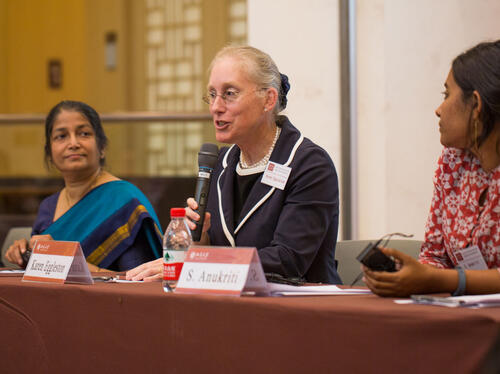Leading scholars and policy specialists convened at the Stanford Center at Peking University (SCPKU) in Beijing on May 25 to examine urbanization, a process that is expected to dramatically impact the Asia-Pacific region into the foreseeable future.
The conference, co-sponsored by the Asia Health Policy Program at the Shorenstein Asia-Pacific Research Center and China’s National Development and Reform Commission, offered a forum to share research and ideas in a multi-disciplinary, policy-oriented discussion using China as a principal case study.
“Urbanization is a very complex process, in China and beyond, so the conference was designed to be accessible to a wide range of contributors and cover a diverse set of topics,” said Karen Eggleston, a conference co-organizer and director of the Asia Health Policy Program. “By locating the conference at SCPKU, we were able to bring experts together centrally in Beijing.”
China’s urbanization experience provides an extraordinary case study given the unprecedented speed and scale of urban sprawl there. The goals set forth by China’s National New-type Urbanization Plan (2014-2020), a state-led strategy that lays out ambitious targets for urban growth, will encourage the country to face related issues – from changes in social dynamics and marriage arrangements to the effects of economic growth and labor migration.

- What key institutional and governance challenges will China face in reaching these goals?
- What might China learn from urbanization experiences of countries as different as India, Japan and the United States?
- How will urbanization interact with population ageing and gender imbalance?
Discussions were facilitated by Stanford affiliates from the Freeman Spogli Institute for International Studies, including Karen Eggleston, also a Shorenstein APARC fellow; Jean C. Oi, a professor of political science and director of the Stanford China Program; Scott Rozelle, co-director of the Rural Education Action Program (REAP); and Xueguang Zhou, a professor of sociology and senior fellow.
“Urbanization and demographic change are two of the most pressing and important challenges facing China today,” said Kay Shimizu, a conference participant, and assistant professor in the Weatherhead East Asian Institute at Columbia University.
“As has been the case many times before, the collaboration between NDRC and the Stanford China Program made great use of its home base at APARC by drawing in scholars working on India and Japan,” Shimizu said. “These comparative cases helped to further highlight common challenges faced by many countries during the urbanization process. I look forward to future collaborations with all of the participants.”

Jean Oi and Niny Khor, an economist at the Asia Development Bank, presented on China’s affordable housing developments and policy, a result of extended empirical research done over the past few years.
“The conference confirmed some known challenges, and exposed new ones, proving that ongoing dialogue and comparative perspective are essential to understanding and discovering solutions to issues related to urbanization,” said Oi, who co-organized the conference. “Co-sponsoring with the NDRC reinforces our commitment to constructive collaboration with the policy community, and joint efforts to facilitate a larger network of idea exchange worldwide.”
Two book projects from the conference are expected to emerge in early 2015. One book will focus on issues related to urbanization, and the other will cover aspects of demographic change.
A full listing of conference participants and presentation titles and a photo gallery are posted below:
Morning Keynotes
“The Institutional Problems in China’s Urbanization Process” - Wang Yiming, Deputy Secretary General, National Development & Reform Commission
“Urbanization and Labor Markets in China” - Cai Fang, Director, Institute of Population and Labor Economics, China Academy of Social Sciences
Panel I: Spatial Development and the Economics of Urbanization
“Spatial Development: Comparing China” - Klaus Desmet, Professor, Department of Economics, Universidad Carlos III de Madrid
“Effects of Urbanization on Agriculture and Food Consumption Patterns in China” - Jikun Huang, Founder and Director, Center for Chinese Agricultural Policy
“The Education Gap between Rural and Urban China: Is the Rural Population Ready for Urbanization?” - Scott Rozelle, Helen F. Farnsworth Senior Fellow and co-director of the Rural Education Action Program, Stanford University
“Land Finance and its Sustainability in the Process of Urbanization in China” - Liu Lifeng, Research Fellow, Investment Research Institute, NDRC
Panel II: Governance and the Political Economy of Urbanization
“Processes of Urbanization: Understanding the Costs, Incentives, and Compensation” - Kay Shimizu, Assistant Professor, Department of Political Science, Columbia University
“Governance and Urbanization in China: Issues from the Chengdu Model” - Yun Ai, Research Associate, China Academy of Social Sciences; and Xueguang Zhou, Kwoh-Ting Li Professor in Economic Development, Department of Sociology, Senior Fellow, Freeman Spogli Institute for International Studies, Stanford University
“Housing Security and BZF Development in China” - Yang Ping, Deputy Director, Investment Research Institute, NDRC
“Institutional Challenges in Providing Affordable Housing in the People’s Republic of China” - Niny Khor, Economist, Asia Development Bank; and Jean Oi, William Haas Professor in Chinese Politics, Department of Political Science, Senior Fellow, Freeman Spogli Institute for International Studies, Director, Stanford Center at Peking University, Stanford University
“Managing Migration using Sons-of-the-Soil Preferences and Violence in India” - Rikhil Bhavnani, Assistant Professor and Trice Faculty Fellow in the Department of Political Science, University of Wisconsin, Madison
Afternoon Keynote
“Fertility, Sex Ratio, and Family Planning Policies in China” - Li Shuzhuo, Director, Institute for Population and Development Studies, Xi’an Jiaotong University
Panel III: Demographic Change and Health
“Fertility, Sex Ratio, Social Status and Gender in India” - S. Anukriti, Assistant Professor, Department of Economics, Boston College
“Health and Urbanization in India” - Indrani Gupta, Professor and Head, Health Policy Research Unit, Indian Institute of Economic Growth
“Economic Impact of Demographic Change in China and India” - Qiulin Chen, China Academy of Social Sciences
“China’s Rural Elderly Left Behind During Urbanization: Health, Pensions, and Village-run Senior Centers” - Karen Eggleston, Director, Asia Health Policy Program, Stanford University
